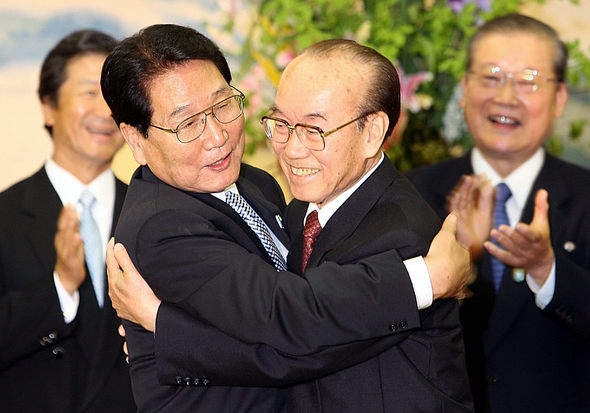 |
|
The head of the pro-Seoul Korean Residents Union in Japan, Ha Byung-ok, left, and the head of the pro-Pyongyang General Association of Korean Residents in Japan, So Man-sul, embrace after signing a joint statement in Tokyo yesterday. In the first-ever meeting between the groups, the two leaders agreed to make a joint effort for reconciliation and cooperation. Tokyo/AFP Yonhap
|
Group leaders say they will work together for the rights of ethnic Koreans in Japan
Representatives of Mindan, a pro-Seoul Korean residents union in Japan, and Chongryon, its pro-Pyongyang counterpart there, held an official meeting at the headquarters of Chongryon May 17 in Tokyo. The meeting signaled an ostensible end to five decades of confrontation and animosity between the two groups.
A seven-person delegation represented Mindan, including its head, Ha Byung-ok, 70. They arrived at the Chongryon building around 10:20 a.m., receiving a warm welcome from seven leaders of Chongryon, including head Seo Man-sul, 78. Mindan officials said through tears, “We never imagined this day would come.” Their Chongryon counterparts were also deeply moved by the meeting. Leaders of both sides wore a badge on which the "unification flag" and the words, "6.15 Joint Statement," the agreement penned by then-South Korean president Kim Dae-jung and North Korean leader Kim Jong-il at their historic summit in 2000, were engraved as symbols of reconciliation.
Mindan and Chongryon held a joint statement signing ceremony after pleasant conversation and an official meeting. According to the statement, the two groups will promote reconciliation and harmony and cooperate for the unity, rights and welfare of ethnic Koreans in Japan, take part in a festival to commemorate the 6.15 Joint Statement as well as a festival to mark Korea’s liberation from Japanese colonial rule in 1945, and promote educational and cultural projects.
After the historic inter-Korean summit in 2000, the two Koreas have, by and large, moved toward greater reconciliation, spurring similar sentiment in ethnic Koreans living in Japan. Most Korean organizations in Japan, whether pro-Seoul or pro-Pyongyang, have participated in joint activities in recent years. Only the leaders of Mindan and Chongryon could not seem to shake off deep-rooted distrust. Mindan last year tried to show a gesture of reconciliation by offering to jointly hold an event to commemorate the 60th anniversary of Korea’s liberation, but the event never materialized. Representatives of both sides, aware of their past failures to put differences behind them, said, “We should have come earlier,” and, “We are very happy that you’ve come."
Mindan and Chongryon reportedly agreed about a week ago to hold the meeting. In an exclusive Hankyoreh interview with Chongryon leader Mr. Seo in June 2004, he said his group felt an extreme sense of rejection by Mindang, describing the other group’s support of North Korean defectors and its independent operation of group tours to Pyongyang as “hostile behavior toward North Korea and an attempt to destroy Chongryon.” As animosity between the two groups continued, an increasing number of members broke away from both organizations. But Since Ha Byung-ok recently began advocating reform in Mindan, reconciliation between the two sides accelerated.
Both sides repeatedly promised to carry out the agreements made at the meeting. “We should put them into action responsibly,” said Mr. Seo of Chongryon, supporting a similar statement made by Mr. Ha of Mindang.
Heo Jong-man, a high-ranking Chongryon official, said, “If we didn’t take these measures, we would be criticized by the next generation.”





